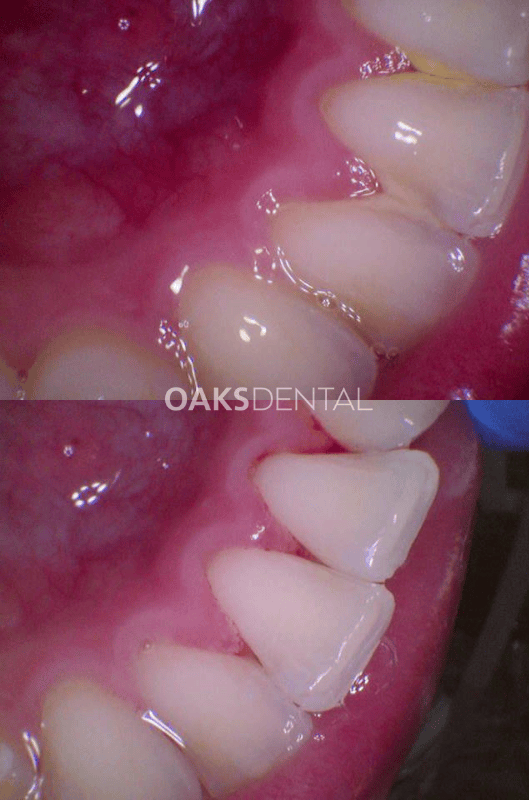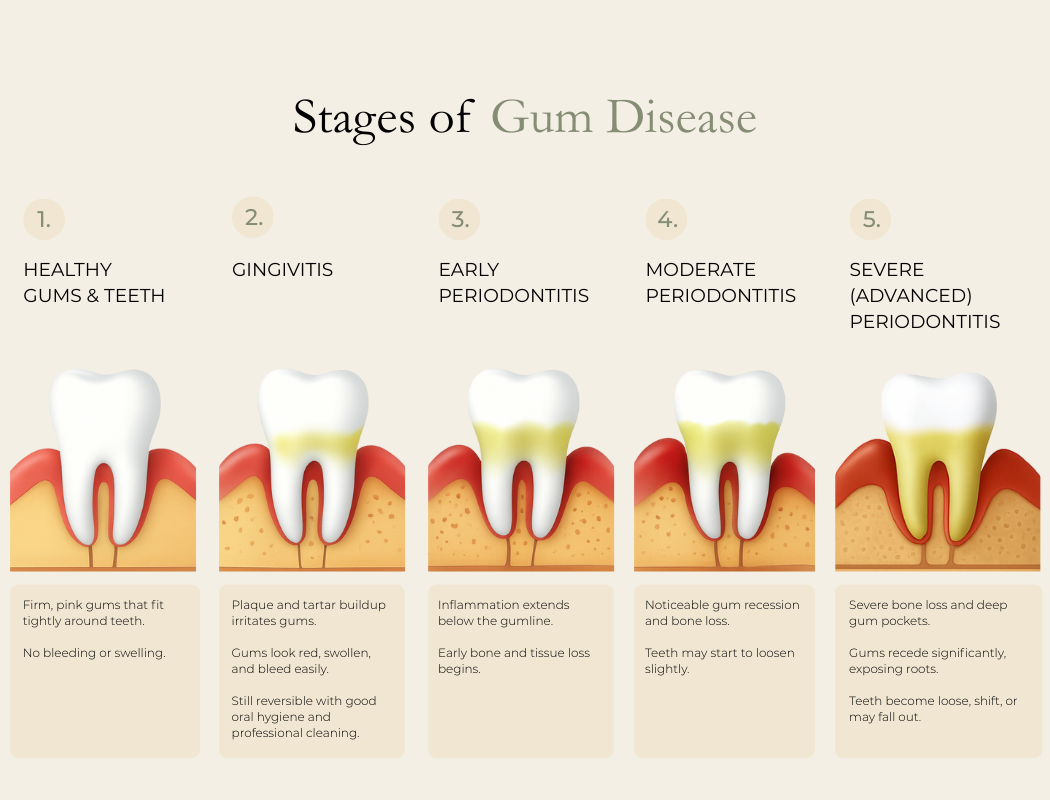NEUTRAL BAY | GENERAL & PREVENTATIVE DENTISTRY
Periodontal Treatment (Gum Disease)
Keep your gums strong and teeth supported with early detection and ongoing care.
What is Periodontal disease (gum disease)?
Periodontal disease (Periodontitis) is a common but serious condition affecting the gums and bone that support your teeth. It occurs due to the body’s response to plaque and hardened calculus—leading to gum recession, bone loss, and even tooth loss if left untreated. But with timely care, it can be managed and even prevented.
How do I know if I have gum disease?
-
Bleeding gums when brushing or flossing
-
Red, swollen or tender gums
-
Persistent bad breath
-
Receding gums or teeth that appear longer
-
Loose or shifting teeth
-
Pus around the gums or a metallic taste in your mouth
Your dentist can check if you have periodontal disease when they measure your gum pockets during a comprehensive oral health or gum check-up. Dental X-rays can also confirm this.

Before & After: Professional cleaning to remove heavy calculus and treat gingivitis — restoring healthier gums and brighter teeth.

Gum Disease Explained: What Causes It and Why Treatment Matters
What causes gum disease?
Periodontal disease (Periodontitis) is caused by the body’s immune response to plaque and hardened calculus under the gums. It can progress silently, leading to gum recession, bone loss, and even tooth loss if untreated. With early care, it’s manageable and often preventable.
A compromised immune response (eg. Smokers, diabetics) can greatly increase your risk to Periodontitis. Some people are genetically susceptible.
How do I treat and manage gum disease?
- Regular at home brushing & flossing.
- Regular deep cleaning – your dentist will recommend an ongoing maintenance plan for you.
- Avoid smoking or vaping, manage stress and diabetes, eat a balanced diet.
- Hormonal awareness – Take extra care during pregnancy, puberty, menopause, or oral contraceptive use.
What happens if I don’t treat my gum disease?
Untreated gum disease (Periodontitis) leads to bone and tooth loss that can’t be reversed. Teeth may loosen or fall out. Ongoing treatment helps stop progression, protect your teeth, and lower risks linked to conditions like heart disease or diabetes.


Frequently Asked Questions
What is the difference between a regular clean and a deep clean?
A regular clean is preventative and targets hardened calculus around healthy gums. A deep clean is for gum disease (Periodontitis) and removes hardened calculus under the gumline and is typically done under local anaesthesia.
How often do I need a deep clean for gum disease?
Patients with gum disease (Periodontitis) typically need a deep clean every 3 months until the gums are stable. After this, we recommend transitioning to a six-monthly regular clean.
Does Periodontal treatment hurt?
We aim to keep you comfortable throughout your treatment. Deep cleans are usually done under local anaesthetic to ensure minimal discomfort. Some mild tenderness or sensitivity afterward is normal and temporary.
Is gum disease curable?
Yes. Gum disease (Periodontitis) is curable with the right treatment, good oral hygiene, and regular professional care. However, while we can stop the dieseae and keep your gums healthy, any bone or gum tissue lost cannot grow back on its own. Our goal is to control the disease, prevent further damage, and help you maintain long-term oral health.
Can Periodontal disease impact my overall health?
Yes, Periodontal disease (Periodontitis) has been linked to conditions like heart disease, diabetes complications, pregnancy issues, and respiratory problems.
How much does Periodontal treatment cost?
The cost of periodontal treatment depends on how advanced the disease is and how many visits are required. We’ll provide a detailed treatment plan and quote after your initial assessment.
Is Periodontal Treatment covered under private health insurance?
If you have dental extras in your private health insurance policy, then you periodontal treatment may be partially or even fully covered. We can check your rebate on the spot.

Not sure if it’s gum disease?
You’re not alone
If your gums bleed when brushing, feel tender, or seem to be receding, it could be an early sign of periodontal disease. A quick check-up can help catch it before it becomes something more serious.
